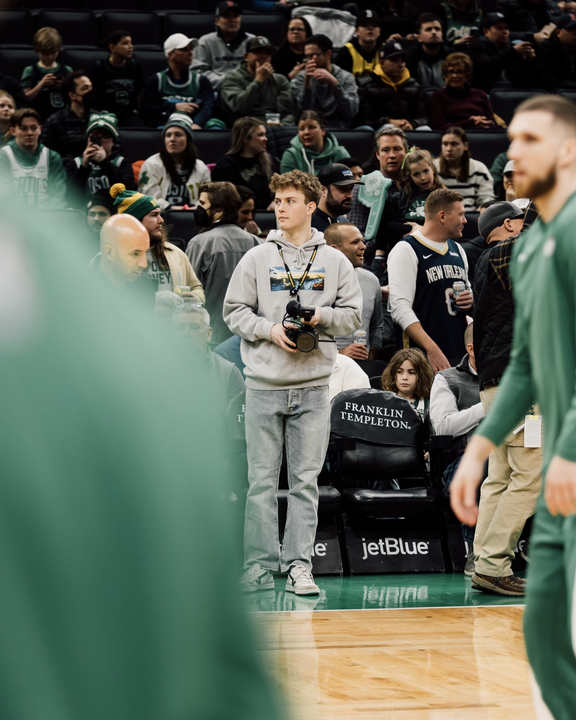By Stephanie Vosk
“The Sopranos” actress Jamie-Lynn Sigler joined other female professionals in the Harvard University Graduate School of Education on Monday to speak about her experience struggling with an eating disorder.
Her presentation was part of an annual public forum titled, “Body Image, Culture ‘ the Media: Shaping the Women of Tomorrow,” in conjunction with National Eating Disorders Awareness Week, February 24 through 28.
“Why me? Why am I up here?” the native New Yorker asked the audience. “Why did I exercise and starve myself almost to death?”
Sigler’s battle with exercise bulimia began after her first high school boyfriend broke up with her during her junior year.
“It was the first time in my life I really felt insecure,” Sigler said.
Soon, she began to limit her food intake and to exercise constantly, until she was working out for four hours before school each morning and taking in only 300 to 400 calories each day.
“I was just sickly and gross, but I couldn’t stop,” she said. “I pushed everybody away, I lost my friends.”
Losing the hair on her head while growing extra hair on her body did not deter her from her cause. It was not until she was faced with the full importance of her decisions that she finally turned around.
Her weight loss, which occurred over the hiatus between filming the pilot and the first season of her hit HBO series, was a shock to the show’s producers.
Immediately after returning to film season one, Executive Producer David Chase pulled the then-minor’s mother into a room and told her, “If [Jamie] does not start gaining weight, we’re recasting her.”
Sigler’s immediate reaction to this was, “Let’s go to McDonalds.”
She then began eating everything in sight, and by the end of the first season, she had once again reached a healthy weight.
With the ten-month break between the first and second seasons, Sigler returned to high school to finish out her senior year.
“I had the best time of my life senior year,” she said. “I got everything back.”
By the time the second season aired, Sigler had put on a little more weight and, while still healthy, the comparison between the first and second seasons of Meadow Soprano was shocking to viewers.
“I knew the comments were going to come, but I didn’t think they would be as harsh as they were,” she said.
When viewers began to post comments on her Web site about her weight, she decided to respond.
“I’m the most sensitive person in the world, so everything affects me,” she said. “I’m a lot stronger now, but it’s hard.”
Her emotional response triggered an invitation to appear on ABC’s “The View.” With tears in her eyes, she finally began to tell her story to the public.
“I’ve got to make something good out of the bad to help myself and to help other people,” she said.
After her network appearance, she received an invitation to be a spokesperson for the National Eating Disorders Association (NEDA). With the program, she began touring to help promote a healthy body image in girls all over the country.
After giving many lectures and writing articles, she decided to publish her entire story in a book titled, “Wise Girl: What I’ve Learned about Life, Love and Loss.”
Sigler, who recently played Belle in the Broadway production of “Beauty and the Beast” and plans to continue her acting career after “The Sopranos” ends, does not want to rely on her image to get her roles in Hollywood.
“I’m never going to compromise my happiness and my health for a role,” she said. “No role is that important to me.”
Sigler, who acknowledged that she at one point looked like “a walking skeleton,” carries two pictures of herself with her at all times to remind herself what the worst was like.
“If I got past that, this will be okay too,” she said.
Through good and bad, Sigler feels that she has learned from all her life experiences, and that she is “just one example.”
“I’m very grateful that I went through my eating disorder, as strange as it sounds,” she said.
However, she said “I’ve accomplished every dream I’ve ever wanted. I’ll die a happy girl.”
Rachel Simmons, author of “Odd Girl Out,” spoke about aggression in young women. She said most girls see the ideal image as skinny, pretty and nice. However, Simmons said that this is actually detrimental to the health of young girls.
“We live in a culture that tells girls to be nice all the time; that tells girls not to be angry,” Simmons said. “In a culture that prohibits anger among girls and women, a tremendous amount of anger gets internalized.”
She said that this anger leads to problems such as cutting, depression and eating disorders.
YM Magazine’s Beauty Director Abby Gardner also spoke about promoting a healthy body image in young women.
Simmons, who wishes “the world was a different place and wasn’t so focused on women’s bodies,” said that YM is trying to do its part. The magazine no longer publishes articles about dieting and uses models that represent a more realistic body image.
“The way that we speak to our readers is indicative of the respect we have for them,” she said. “They value what we have to say more because they like the way we say it.”
Simmons admitted, “We’re not perfect, but we’re trying our best in an industry that doesn’t always seem to be trying very hard.”
Sarah White, who helped to organize the event, said that each year, the Harvard Eating Disorders Center tries to find people who are “interested in the topic and want to speak out about it.”
Marking the seventh year of the forum, previous speakers have included actress Natalie Portman, Olympic swimmer Dara Torres and plus-sized model Emme.












